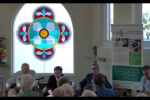The Department for Health and Social Care has issued a call for evidence for evidence will inform the development of the Down Syndrome Act statutory guidance to improve access to services and life outcomes for people with Down Syndrome. The government is seeking views on what should be included within the guidance. It will consider those views when producing draft guidance.
The topics that the DHSC is interested in hearing about are those listed in the Down Syndrome Act that ‘relevant authorities’ will have to pay ‘due regard’ to when the final guidance is published:
- Health
- Social Care
- Education & Youth Offending
- Housing
The call for evidence closes at 11.45pm on 8 November 2022.
"Ministerial foreword by Gillian Keegan
We know that with the right support, people with Down’s syndrome can live independently and participate fully in society.
Although there are already legal duties and frameworks in place to ensure that services are tailored to people’s needs, we have heard that people with Down’s syndrome and their families often find it difficult to access the right support.
My nephew, Joseph, is one of the estimated 47,000 people in the UK who has Down’s syndrome. But my brother and sister-in-law have had to work incredibly hard to access the services that have made it possible for Joseph to thrive.
We need to raise awareness of the unique needs of people with Down’s syndrome and how they can be met.
The Down Syndrome Act, which received Royal Assent on 28 April 2022, aims to improve access to services and life outcomes for people with Down’s syndrome. I am grateful to the Rt Honourable Dr Liam Fox MP for bringing forward this important legislation. The Act requires government to develop and consult on guidance that authorities must have regard to when providing certain health, social care, education and housing services.
I am delighted to launch this national call for evidence which will inform the development of the draft guidance. We want to hear from people with Down’s syndrome, their families and carers regarding their experience of services. We also want to hear from professionals who work in health, social care, education and other local authority services, and the voluntary and charitable sector. In parallel, we will be engaging with people directly through workshops and focus groups.
We want to hear your views on the specific needs of people with Down’s syndrome, to what extent those needs are understood, and examples of best practice within health, social care, education and housing settings.
It is crucial that this guidance is fit for purpose so that we can ensure people with Down’s syndrome can access the support they need to thrive in their community. This call for evidence will be open for 16 weeks to ensure maximum engagement. This will allow us to collect invaluable information over the next few months, which will then be used to inform and support the production of the guidance. The draft guidance will in turn be published for full public consultation before final guidance is published next year.
Gillian Keegan"

